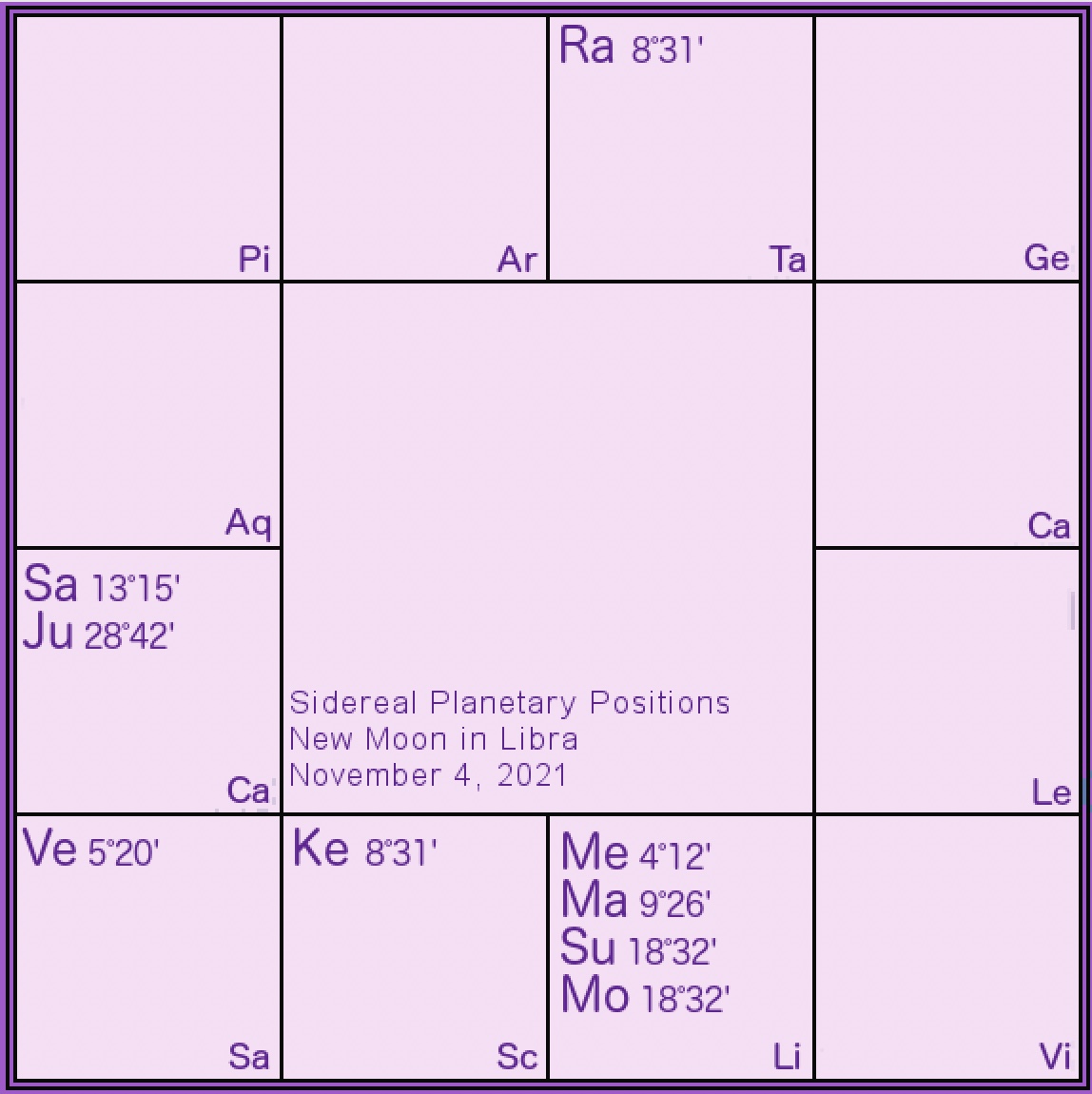Diwali New Moon 2021
Thursday, November 4th brings a New moon at 5:15 pm ET and marks the celebration of Diwali, the Hindu festival of lights. As the world outside darkens, we clean our houses and light candles and lamps to celebrate the light, calling in the auspicious blessings of goddess Lakshmi and Lord Rama, gathering with family and friends to share warmth as the season becomes cold.
New Moon in Libra and Swati
This Diwali is marked by the New Moon in sidereal Libra, as Sun and Moon join with both Mars and Mercury there. Libra is a sign about balance, where we seek to bring balance and harmony into our relationships and the outer world. The sky is very imbalanced at this time, however, with eight out of nine grahas clustered on one side of the sky, towards the galactic center.
The four planets join in the Vedic nakshatra of Swati, symbolized by a young sprout blowing in the wind. With Sun debilitated here, it can be easy to lose our center and fall out of balance, especially as the cold vata winds are increasing in the outer atmosphere. This time of year self-care is of utmost importance!
Saturn and Jupiter
Saturn and Jupiter are together again in sidereal Capricorn, with Saturn aspecting the New Moon and putting on the pressure to constrict pleasures and focus on responsibilities. The two together can bring power to some situations, but despite the neecha bhangha yoga being created, Jupiter will be much more comfortable and able to offer more expansive blessings when he transits once again into Aquarius on November 20th.
Eclipses
This New Moon actually brings us straight into an eclipse period, with a lunar eclipse occurring on the coming full Moon of November 18th-19th, and a total solar eclipse on the next New Moon of December 4th. Eclipse periods stir up energy from the shadows, making red flags wave bright and bringing the opportunity to navigate discomfort with grace or clumsiness. Depending on your natal chart this could be stimulating change in one particular area of life.
Diwali
On the new Moon of the Hindu month of Ashwin (this month), we celebrate Diwali, the festival of lights. The festival began this year on November 2nd (North America), on the 13th waning Moon phase of the previous cycle. This day is known as Dhanteras, or Dhanvantari Tryodashi, the celebration of the birth of Lord Dhanvantari, the father of Ayurvedic medicine. If you practice any healing tradition, especially Ayurveda, it is a good day to give thanks and call in auspicious blessings to your healing path or practice. Diwali is strongly associated with the Goddess Lakshmi, and is a powerful time to connect with her, calling in her blessings for both material and spiritual prosperity.
We celebrate Diwali while the days are getting noticeably shorter and darker, and it is a time to invite more light into our lives, our hearts, and our world. This festival celebrates the victory of light over darkness, which is something to rejoice in and have faith in, even if we can’t outwardly observe it sometimes. Creating positive vibrations internally is the best way to begin growing and spreading them externally.
Diwali also commemorates Lord Ram’s and Sita’s return from exile after fourteen years (a story from the Ramayana). Lord Ram embodies the highest qualities of dharma, devotion, compassion, courage, and leadership. Diwali is also the start of a new lunar cycle, so it’s a great time to go within and summon these qualities to awaken and live through you.
Diwali (also seen as Divali, Deepawali or Deepavali) comes from the Sanskrit words deepa (light) and avali (row). It is traditional to light candles throughout Diwali (opt for electronic tea lights if you’re in a fire danger zone!), inviting the highest light into our homes and lives. The candles are lit to remind us of the inner divine light in us all. Though one flame can be used to light many others, it is not diminished by sharing its power of illumination. We can pray for the peace and happiness of all beings, and each one’s awareness of their inner light.


